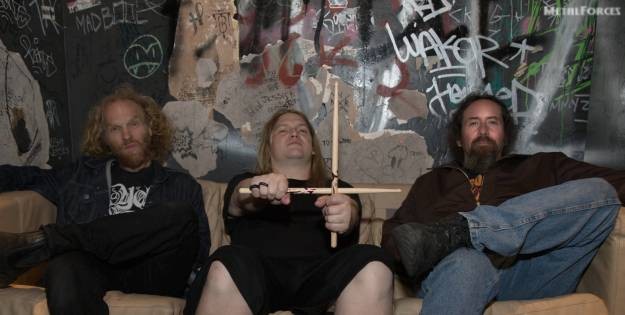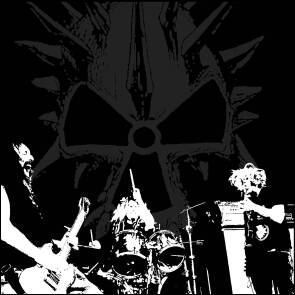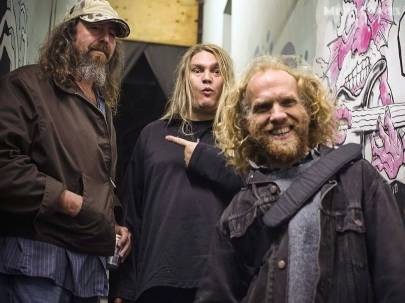
CORROSION OF CONFORMITY – The Nectar
Anthony Morgan
July 2014
 Corrosion Of Conformity (l-r): Mike Dean, Reed Mullin and Woody Weatherman |
![]()
Writing sessions for IX – the 9th studio full-length album by Raleigh, North Carolina-based heavy metal trio Corrosion Of Conformity – started in the early months of 2013, with the demo and recording process beginning by the end of the summer. Completed in January 2014, IX clocks in at almost 45 minutes.
“I think this time, we didn’t think too much about it,” observes Mike Dean, vocalist and bassist for Corrosion Of Conformity. “We just had some good musical ideas together, and so we were happy. At the end, it was kind of time to come up with some vocal parts and some lyrics. It was really like a stream of consciousness type of approach, where you just start singing some gibberish. That establishes your vocal melody, and then you take that home and sit with it for a while. You start to hear some words that make sense out of the gibberish, and pretty soon you start to craft it into something that’s a little more poetic, and pretty soon you find a narrative.
“That’s just kind of how we did it. I think that Reed (Mullin, drums) had a couple of songs already written, almost fully formed, like ‘Tarquinius Superbus’ and ‘Denmark Vesey’. He just brought those to us, and then we changed the arrangement a little bit. Other than a part or two though, he had the concept down. I think some of those riffs are actually quite old, which is a real exception on this record, because most of it was born in the moment. I’m trying to think of something I had… Yeah, I may have had the arrangements pretty much already in my head, although they had a few loose ends that we could collaborate on. I had none of the lyrics or vocals until the absolute last minute, mind. Other than that, it was pretty collaborative.”
Some musical parts are penned collaboratively, while other musical parts are authored prior to members convening. “I think it’s about half and half,” the frontman estimates. “A lot of times we just have a couple of basic riff type of ideas that we bring together, arrange together, and all of that. Woody’s (Woody Weatherman, guitars) kind of famous for coming up with two parts that he thinks goes together, and just kind of leaving the rest to the group. I do that as well, although I bring some fully formed songs. It’s important – to me, anyway – to have at least some of the process be more collaborative like that. I actually really like to leave a lot of it to the last minute, so that when you’re recording, there’s actually… It’s good to have some of it in the bag and ready to go, but at the same time, I like to have a couple of songs where you’re recording and the piece is actually being born – like ‘Brand New Sleep’, which turned out to be the first song on the record.
“I don’t think those guys thought it was gonna be on the record – it was just kind of an afterthought to them. We just kind of ran through it a few times; I had Reed and Woody playing it without any headphones, just live in the room. There were lots of bleed, lots of guitar on the drum mikes, and things like that. That’s not usually the way we would do it, but it sounded good. I don’t think they were thinking about getting some kind of take for the album. I think they thought it was just a throwaway track, but then I put a vocal on it, and pretty soon it was the first song on the record. The reason I liked it so much was because it was just real natural sounding – it wasn’t like there was a lot of pressure to make it perfect, or anything like that. It just breathed better. Yeah, I like a more collaborative approach. It’s good to have a lot of the material be maybe not quite finished, so that it comes together at the moment you’re recording it. That’s more special, more live.”
Crafting material in said fashion means that should a member generate an idea, fellow members can subsequently add their own individual flavours. Therefore, a greater band feel is nurtured. “That helps, because a lot of these musical projects are just some kind of megalomania, and technology allows you to do that now,” Mike comments. “You get some good stuff that’s really crystallised, but I think it’s kind of boring. I like old time concepts, like a group and an album (laughs). I like where a group of people make a group of songs that kind of have to hang together, and eventually you see how that goes. That’s kind of where I’m coming from.”
Many groups seemingly exchange mp3 files over the internet nowadays, as opposed to convening at a rehearsal room and jamming together. “Yeah, that’s true,” the four-stringer concurs. “There are periods of time when we don’t get in a room together. Woody lives two hours away – out in the country – so when he comes to town, we better be ready to play music (laughs). But yeah, when we do get together, that’s what it’s about for sure.”

|
Several tracks can be identified as Mike’s primary songwriting contributions towards IX. “‘On Your Way’, ‘The Hanged Man’, ‘The Nectar’,” he cites. “I can’t remember what else… ‘Brand New Sleep’ has a couple of ideas that were Woody’s that I don’t know he really wanted to pursue that much, but we hijacked them and made it the first song (laughs).”
Albums four through six were cut as a quartet, while albums two, eight and nine were laid down as a trio. Differences exist between trio and quartet line-ups, beyond the obvious factors. “For starters, 33% is a little better than 25%,” the singer quips. “There’s less possibility for… It’s one less opinion. In a group situation, as far as actually playing music like that, you can hear everything a little better. It’s one less major element, so you can hear everything a little better. You can get away with playing more notes, things like that, but at the same time, if you make a mistake then it’s really clear – there’s nowhere to hide. It’s kind of a double-edged sword as far as that goes, but we just roll with it. It’s not really that much different. The drawback would be you can’t have your Thin Lizzy-esque dual guitar harmonies, and what not (laughs). You pretty much have to get your harmonic complexity off of the bass and the guitar, which can be interesting.”
The fate of Corrosion Of Conformity possibly becoming a quartet once more lies in the hands of one individual. “So far, up to this point and right now, I couldn’t really imagine getting another guitar player unless it was Keenan (Pepper Keenan, erstwhile Corrosion Of Conformity guitarist),” Mike admits. “There’s been talk about doing just that, but it’s a little logistically challenging with the schedule. It’s something that we’re all interested in pursuing at some point though, but with Keenan and not somebody else (laughs).”
Pepper could theoretically become an intermittent member who records and tours with Corrosion Of Conformity sporadically. “That certainly sounds possible,” the rhythmist ponders. “We’re open to whatever, but yeah. Given the realities of living 14 hours away in New Orleans, and being in a successful band (Down) that’s kind of got new life in the form of Patrick Bruders who plays bass, and then now getting Bobby (Landgraf) to play guitar… They kind of got a lot of new blood the last couple of years, and like a new spirit. They’re not just successful in terms of people; I’ve seen them play, and they’re successful musically, and so it’s a hip thing. It’s about not inhibiting that, but yeah. We’re open to whatever, but I think what you described is probably likely yeah.”
Mike toured as a live bassist for Californian stoner group Vista Chino, the ensemble performing in support of September 2013 effort Peace. All the while, demo and recording sessions were underway for IX. “Well, it could’ve been distracting, but I think it was good to get away from…,” he begins. “There’s a lot of problems – a lot of small details and small problems – with putting a new group of songs together, and making them right and making them sound right. Sometimes you can get focused on the microcosm and the small details, and things like that. Sometimes you just need to get away, and get back in a situation where you can have a correct perspective, and see the bigger picture and all of that, and just get out and get some new inspiration. It was good like that, for sure, but it did kind of compress the schedule into where we were almost feeling a deadline when we did get back to work.
“We might’ve worked on this over the course of the year, but certainly not more than two weeks at a time. Not a total of more than, I don’t know, six or eight weeks out of the whole year (laughs). I think the pressure can be good or bad, but in this case it was good. It didn’t linger on too long in terms of any one perceived problem. It was just keeping it moving, keeping it flowing. I think that makes it alive, as opposed to being something you had time to attempt to make too perfect, which is kind of my pet peeve these days with recordings – especially in metal, hard rock, and things like that. There’s a lot of emphasis on making everything perfect, which tends to destroy the spirit of it.”
Such comments reminds yours truly penning this feature of Chinese Democracy, the sixth studio full-length from Guns N’ Roses. From its 1994 inception until its November 2008 release, it took all of 14 years to arrive. “Oh, right,” the vocalist chuckles. “I’ve actually never heard that. I think Use Your Illusion (September 1991) might be the last Guns ’N Roses album I heard – actually, that might be the last Guns ’N Roses album. I haven’t heard Chinese Democracy, but I don’t consider it a Guns ’N Roses album. It’s kind of like an Axl Rose and whoever he could get to stick around kind of album. If you believe that Guns ’N Roses is Axl Rose, then I guess it is one. I’ll have to hear it someday, but as long as I can avoid it, I’ll try to (laughs). I’m kind of a Slash fan (erstwhile Guns ’N Roses guitarist). Slash is Slash, and then there’s those other guys – whatever their names are. Those are the real guys.”
Although members were busy with various preoccupations, IX has arrived a mere two years following Corrosion Of Conformity’s February 2012 self-titled opus. “I’d like to step it up a bit there,” Mike divulges. “We did have an EP in-between, so it was pretty good output for two years. Yeah, if we could get it up to every 12 months or so, that would be about right. I look at the output of my favourite bands from way back in the day. If you look at records like Black Sabbath (February 1970), Paranoid (September 1970), Master Of Reality (July 1971), and Vol. 4 (September 1972), those came out at a rate of certainly less than one per year, and the same with the Jimi Hendrix records, and things like that. I think it’s possible to step it up a little bit from there, and produce great music. As long as you get your process down and keep it stripped down and honest, I think it’s possible to step up the production and the quality. Ideally, that’s what I’d like to be doing.”

|
IX’s musical direction is “a re-exploration through totally different facets of some of the very same influences that we’ve been stewing on all along,” the bassist contends. “Just taking on elements of the early heavy rock we like, in terms of Black Sabbath, Deep Purple. Some of the metal stuff like Iron Maiden and Motörhead, and then all of the hardcore influences like Bad Brains and a little Black Flag. Just throwing that all together, and seeing what comes out but in a different way – just trying to be more fluid with it. I think there’s elements here of some of the stuff from Deliverance (November 1994) and there’s elements from Animosity (October 1985), but it’s 2014 and we’re kind of in a different situation, a different place in life. We’re not looking to go back and reinvent the wheel, necessarily. It’s like what Mark Twain said: ‘History doesn’t repeat itself, but it rhymes’ (laughs).
“If we can do something that’s in tune with what our identity has been in the past and it’s more or less in line with the expectations of fans, that’s great, but the primary thing is to kind of be who we are now. In this case, I think all of those things are in accord. It’s a pretty spontaneous record without a lot of pretence or a lot of calculation, because we didn’t really have a lot of time to do a lot of calculation. Every time we’ve tried to be calculating, that particular calculation didn’t work out, and we just ended up going with what came natural anyway. This time, we’re just kind of getting to the point, and just playing music that interests us. If it’s interesting to us, then there’ll be a sincerity about it, and hopefully it’ll interest other people too.”
Debut in earnest Eye For An Eye surfaced 30 years previous in May 1984, though Mike isn’t fond of that particular platter. “I’m not a big fan of that record,” he shares. “There are some good riffs on it, but I think it was kind of a premature introduction to the band. It was a learning process, but I’m not really happy with it being paraded around now. I think there are similarities. Some of the best parts of that is it’s kind of loud and bombastic, but the slower parts are super… and even the faster parts – there’s actually a super-blues based element to the song structures. In a strange kind of way I see some of the same patterns, some of the same harmonic structures and stuff in the music. I’m not a big fan of the songwriting or the vocals on that, but there are some good riffs.
“There was a time when – in the United States particularly – if you were a hardcore band and you played that style of music, people would support that because there was a whole new scene. You could go anywhere; if they heard you were a hardcore band, they would come out and see you play. We were eager to get a record out, and do that. We saw that Bad Brains were playing 200-300 shows a year, and that Black Flag were driving around in a van playing all of these small clubs, and just doing it every night. We thought ‘We could do that.’ That was just us, at that time, trying to realise our dream, but as a musical document I’m not recommending Eye For An Eye to anyone. I was personally outvoted in terms of re-releasing that, by people that wanted to do that. I didn’t wanna crush their dream of making hundreds of dollars, so… But yeah, I don’t think it’s a very flattering start. The drumming’s good (laughs). The drumming’s good for somebody who plays drums. It’s good by any measure, because it was done by somebody who had been playing drums for two years, or 18 months. To put it into perspective (laughs).”
In the composer’s opinion, October 1985’s Animosity – the band’s second full-length affair – was the first proper introduction to Corrosion Of Conformity. “Not because of who was necessarily in the band, but it reached a level of just enough accomplishment to get the job done, and a good amount of energy relative to that level of expertise,” he judges. “It became a good amalgamation of the influences, which were sort of deconstructed and reassembled in a way that was fairly original. It was original, and it was energetic. I like that record, yeah. To me, that’s the first one.”
IX’s lyrical matter isn’t open to definitive analysis. “With the lyrics on this new record, most of it is meant to be pretty evocative and kind of wide open to interpretation,” Mike reasons. “I’m not really interested in… I may have something in mind, but for me personally, when I’m writing lyrics I may just be letting the collective unconscious throw me a few lines. Then I’ll stop, and I’ll look them over, and I’ll try to find a coherent line of thought in them and develop that a little bit. It’s pretty much evocative and open to interpretation, but there are various themes that subconsciously have especially drifted towards just how we as higher primates respond to different dogmas, political and religious. How eager we are to just adopt one of these points of view, just basically off of the shelf – off of the internet, or whatever – and just kind of follow the scripts, obviously. How there’s manipulation in doing that, and how that works, and how that’s basically at work in terms of political and religious thought. That theme appears, but it’s certainly not in every song.
“Like I said, a lot of it is a pretty stream of consciousness type of approach. It’s something I developed watching Keenan write vocal melodies. Not so much his lyrics, but his lyrics where you’re searching for a melody so you just spit out some gibberish. Phonetically, some of the gibberish starts to sound like words that might be good words to the song. Once you’re right there, then you see if you have a topic or something that goes with it, or you just hope that the phonetics guide you towards a subject matter, which is kind of a cool manner of creating and discovering things. Like I said, we’re not very calculated. And personally, I’m not really interested in topical, on the nose songwriting that I think tends to make songs sound dated, and tied to a particular time. I like to try to get beyond that, and make it a bit more of a versatile composition.”

|
A recording studio in Corrosion Of Conformity’s hometown of Raleigh, North Carolina closed its doors temporarily, a studio the group has subsequently recorded at since cutting November 2012 EP Megalodon, the EP having been laid down prior to the band’s self-titled jaunt (issued eight months prior). “At one time this place had a nice Trident Trimix console desk from the late 70s, early 80s, and a bunch of outboard gear,” the lyricist reveals. “The business of music is apparently not that profitable, so the studio went out of business. The guy that ran the studio – the head engineer – moved to Florida, and went away. Some friends of ours, a thrash metal band, kind of took it over as their rehearsal spot, and just started reassembling the infrastructure – this time computer-based. When it came time for us to do the Megalodon EP that we did, we kind of looked it over. I asked the guy if I could… This guy has the digital and the computer-based stuff, and I’ve been sort of assembling the analogue stuff – a console, compressors, microphones, and things.
“I just asked him if he’d maybe give us a nice deal, providing I allowed him to use my equipment – that perhaps we could pair up. We got a nice deal to do that, and so then we decided to completely pool our resources moving forward. We did a Sourvein record there in addition to the C.O.C., and a couple of other things. We’re about to do another full-length Sourvein LP in September, so yeah. We don’t really have a name for it yet – for the operation – but when the right one comes to us, we’re gonna be thinking about trying to really expand on this music production brand. I think the main thing was the live room is designed really well; if you like a drum sound where you use a lot of distant miking and you use the sound of the room a lot, then it’s a good place to operate – it’s flattering. I don’t think it was purposely well designed; I think it was a happy accident.
“It’s just a place to get some work done, whether you wanna do it in isolation or do it all together. A lot of times, that’s one of the main things that I think people might miss about working in a real studio; really just the space and the design for what works well, as opposed to being cramped in some tiny space – in just a warehouse type of situation, or something like that. We like the physical space, and we wanna try to do as much good work there as we can.”





